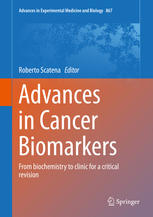پیشرفت در نشانگرهای زیستی سرطان: از بیوشیمی تا کلینیک برای بررسی انتقادی ۲۰۱۵
Advances in Cancer Biomarkers: From biochemistry to clinic for a critical revision 2015
دانلود کتاب پیشرفت در نشانگرهای زیستی سرطان: از بیوشیمی تا کلینیک برای بررسی انتقادی ۲۰۱۵ (Advances in Cancer Biomarkers: From biochemistry to clinic for a critical revision 2015) با لینک مستقیم و فرمت pdf (پی دی اف)
| نویسنده |
Roberto Scatena |
|---|
| تعداد صفحهها |
372 |
|---|---|
| نوع فایل |
|
| حجم |
9 Mb |
| سال انتشار |
2015 |
89,000 تومان
معرفی کتاب پیشرفت در نشانگرهای زیستی سرطان: از بیوشیمی تا کلینیک برای بررسی انتقادی ۲۰۱۵
در حال حاضر، تعداد فزاینده ای از مولکول های زیستی برای درک نقش بالقوه آنها به عنوان نشانگر زیستی سرطان برای اهداف تشخیصی، پیش آگهی و درمانی تحت بررسی هستند. جالب توجه است، آخرین تحقیقات در مورد نشانگرهای زیستی سرطان، یافته های امیدوارکننده و جذاب را به عنوان شکست های آشکار نشان می دهد. همچنین از نقطه نظر بالینی، یافته های متناقضی در مورد استفاده معمول بالینی از نشانگرهای زیستی سرطان فعلی وجود دارد. برخی از بیماران ممکن است به سادگی در دوره خود با یک نمونه خون دوره ای تحت نظر قرار گیرند، اما گاهی اوقات این نظارت محدودیت های قابل توجهی را نشان می دهد. بسیاری از بیماران عودهای شدید و گسترده را بدون تغییر قابل توجهی در غلظت بیومارکر سرم آزمایش شده نشان می دهند. اغلب پزشکانی که باید از این نشانگرهای زیستی استفاده کنند، محدودیت های آنها و کل کاربردهای بالقوه را نمی دانند و گاهی اوقات این دانش تحت تأثیر استراتژی های اقتصادی و بازاریابی قرار می گیرد. این دانش محدود و “آلوده” می تواند عواقب جدی برای بیمار داشته باشد. هدف این کتاب این است که با گذر از فیزیولوژی و پاتوفیزیولوژی، تمام جنبه های بیومارکرهای سرطان، از خواص بیوشیمیایی آنها گرفته تا تمام پیامدهای بالینی را به اطلاع عموم برساند.
این رویکرد انتقادی نسبت به بیومارکرهای سرطانی قدیمی و جدید باید درک عمیق تر و مفیدی از شاخص تشخیصی و پیش آگهی این پارامترهای ضروری پزشکی آزمایشگاهی را ارتقا دهد و در عین حال جستجو برای ویژگی های جدید و حساس تر را تسهیل کند. سیگنال های تکثیر سلول های سرطانی
At present there are a growing number of biomolecules under investigation to understand their potential role as cancer biomarker for diagnostic, prognostic and therapeutic purposes. Intriguingly, the state of art on cancer biomarkers research shows interesting and promising results together to clamorous failures. Also from a clinical point of view, there are contradictory results on routine clinical use of the present cancer biomarkers. Some patients may be simply monitored in their course by a periodic blood sample, but sometimes this monitoring shows dramatic limits. A lot of patients show serious and extensive relapses without significant change in serum concentrations of biomarkers tested. Often the physician who should utilize these biomarker does not entirely know their limits and the total potential applications as well and sometimes this knowledge is influenced by economical and marketing strategies. This limited and “polluted” knowledge may have dramatic consequences for patient. The aim of this book is to diffuse all aspects of cancer biomarkers, from their biochemical peculiarities to all clinical implications by passing through their physiology and pathophysiology.
This critical approach towards old and new cancer biomarkers should foster a deepened and useful understanding of the diagnostic and prognostic index of these fundamental parameters of laboratory medicine and in the same time facilitating the research of new and more sensitive-specific signals of the cancer cell proliferation.




